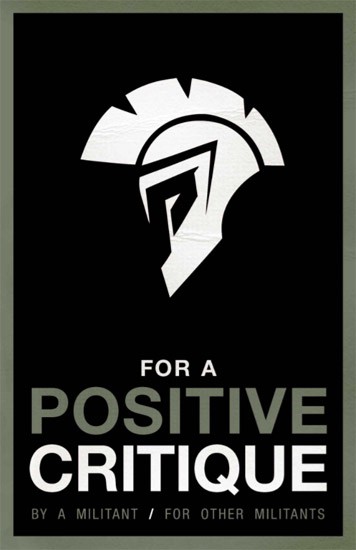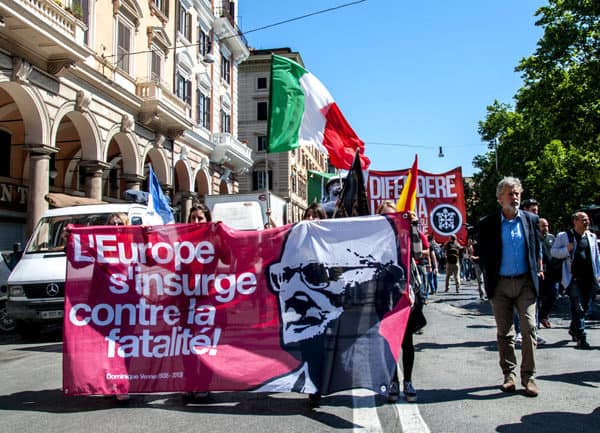Rules for Revolutionaries
Thomas Jackson, American Renaissance, January 5, 2018

Dominique Venner, For a Positive Critique, Arktos, 2017, 50 pp., $11.50.
In some respects, we are revolutionaries. We want to overthrow a system of thought that is deeply rooted in every institution in our society. We want to change the world. What must we do to succeed?
Many authors have written about revolution, and they teach useful lessons. The best known have written about leftist, egalitarian revolution, but a few have written about nationalist revolution. One of these was Dominique Venner (1935 – 2013).

Venner was a prolific French historian and essayist with a particular interest in weapons and hunting. He was also a member of the OAS, a French paramilitary organization that was prepared to use terrorism to change French policy on Algeria and keep it French. On May 21, 2013, he committed suicide in the cathedral of Notre Dame de Paris, as a final act of protest against what he saw as the decadence of France. Most notably, he opposed same-sex marriage, non-white immigration to Europe, and the Americanization of Europe.
Venner wrote For a Positive Critique while serving an 18-month prison sentence for his work with the OAS. It is a short book — just 50 pages — of rules for revolutionaries, a kind of nationalist version of Lenin’s What is to be Done. It is well worth reading.
Venner opposed both Marxism and liberal capitalism; both reduced people to ciphers. He championed nationalist revolutions within European countries that would lead to a Europe-wide consciousness of the continent’s heroic destiny. Venner did not bother to criticize Marxism; its flaws were obvious. His views of Western liberalism, however, are worth quoting at length:
Today, the “liberal regimes” of the West are characterized by a large privileged cast, which serves as an agent of financial groups, who control all the political, administrative, and economic levers, united in their complicity . . . . They hold a monopoly over political and economic power. They control most of the media and are the masters of thought. They are protected by vast police forces. They have turned their people into obedient little sheep. Only controlled opposition is tolerated. . . .
Using the permanent one-way propaganda, to which everybody is subjected from childhood, the regime, in all its forms, has progressively intoxicated the French people. This is true of all democratic nations at this point. Any critical thought, any personal opinion is destroyed. The moment those keywords that trigger their conditioned reflex is uttered, all reason is thrown out the window. . . .
These lines were first published in 1964. Venner was not the first to have detected a “privileged caste” that appears to serve the people but controls them. However, it is remarkable that he had already seen the rigid uniformity of thought in the allegedly “free” West, and had understood how “keywords” can “trigger” a complete abandonment of reason. These insights could not be more relevant today.
He also noted the destructive effects of globalism:
The capitalist oligarchy is indifferent to the fate of national communities. Its goal is to satisfy an insatiable will to power through the economic domination of the world. Mankind and its civilizations are sacrificed upon the altar of its materialistic designs, which parallel those of Marxism. For technocrats and Communists, man is but an economic animal endowed with two functions: produce and consume. . . .
Individual tendencies, which do nothing but inconvenience the practical application of plans, must disappear. In materialist societies, there is only room for docile, homogeneous and standardized masses. . . .
Rebellion leads to physical elimination in a communist regime and to social elimination in a liberal regime. Thus, the one and the other destroy creative individualism and popular roots, the very essence of mankind and its community.
At the height of the Cold War, only a few independent thinkers saw that “liberalism” could be just as totalitarian as Marxism. Now we see this much more clearly. Venner hated Marxism, but he also despised Westerners who could not hear the clanking of their own chains. He saw democracy, idolized in the West, as a delusion that made it possible to believe we are free:
Liberalism and Marxism have taken different paths which have brought them to oppose each other but which lead to the same result: the subjection of people misled by the Democratic myths. Democracy is the new opiate of the masses.
Under both systems, men were neutered through materialism. Venner insisted that “the economy is not an end in itself,” and that “the economy must be subjected to political will.” However, to whose will should it be subject, and how? Venner offered few details about the new Europe he was fighting for. This is as close as he comes to describing his vision:
The ethos of honor opposes the slave morality of liberal or Marxist materialism. It affirms that life is a battle. It exalts the value of sacrifice. It believes in the power of the will. It bases the relationship between men of the same community on loyalty and solidarity. It gives work an importance independent of profit. It recovers a true sense of dignity to mankind, not given, but conquered through endless struggle. It gives European man an awareness of his responsibilities in relation to humanity, of which he is the natural organizer.
But how will this new order function? What will give work an importance independent of profit? How will we exalt sacrifice and instill solidarity? Some readers will assume that Venner is writing about fascism, but he was not a man to shy away from ideas just because they were unpopular. Also, from his other writing it is clear that, for him, the “ethos of honor” and “a true sense of dignity” have their most authentic roots in ancient Greece.
Venner’s abstractions about the goals of the revolution are in contrast to the concreteness of his revolutionary methods. He wrote, first of all, that there must be a clear, coherent doctrine. This motivates activists and wins over waverers. The doctrine must be simple and convincing enough to unite all revolutionaries. Venner writes that activists fail to act in unison because their doctrine is unclear: “Revolutionary unity is impossible without unity of doctrine;” “the development of new doctrine is the only answer to the divisions between activists.”
Venner also believed that no national revolution could succeed without obedience to a single, unified organization that promotes this doctrine. He wanted agents of that organization at every level in every part of society and government, acting together to overthrow the existing order. The organization must be able, like the Bolsheviks, to impose its political line.
Venner wrote that the enemies of the revolution — the supporters of the status quo — do not need a central organization because they, in effect, already are one. They have so convinced themselves of liberal myths that they do not need to take orders; they all give themselves the same orders.
Today, we see this in the decentralized but uniform way private organizations police themselves and the rest of us. Is there a single internet company, newspaper, television network, church, university, or politician capable of defending a truly unfashionable position? It is as if they were all taking orders from the same Ministry of Truth, but they need no such ministry because they are already in lockstep.
Some of Venner’s best advice is about people. He is adamant that incompetents, defectives, and psychopaths cannot make a revolution: “[T]hey scare away the healthy elements and prevent the recruitment of quality militants. . . . . The cranks must be pitilessly pushed aside.” He adds that dressing up in uniforms and gratuitous violence are “infantile practices,” and that revolutionaries should never appear outlandish:
Extravagance in expression and the promise of Apocalypse have never helped the Nationalist cause, on the contrary. The enemy find easy arguments, people avoid men who appear like dangerous fools, partisans become discouraged or become deformed in their turn.
Numbers meant little to Venner; quality of activists meant much more than quantity. He also insisted on discipline and the ability to put the revolution first. He warned that egoists are “unable to identify their place in the struggle, they have a taste for disorderly action. Their vanity pushes them to gratuitous individual acts, even if their cause suffers from it.”
Venner also warned that elected representatives can be comrades but must be closely watched:
If the wind turns, they do not hesitate to betray their flag and their comrades. Their seat in Parliament is not a means but an end in itself. [They think] it must be kept at all costs.
Venner scoffed at anyone who expects a “great man” to lead the revolution. Success comes from “the quality of comrades and methodical, well reasoned struggle.” He writes:
The Nationalist does not need followers but militants who are defined by their doctrine, not in their relation to a man. He does not fight for a pseudo-savior, for the savior is found within himself. Those who take the helm can disappear or make mistakes and they are replaced. . . . An organization must be a community of militants, not someone’s personal property.
Venner believed that revolution would be contagious, and that the first national revolution would be the seedbed for others. In the meantime, all European revolutionaries should cooperate and share ideas. “Economic treaties will not unite Europe,” he wrote. “The nationalism of its people will.”
Only a Europe united by nationalism could create valuable institutions. Without that unity, European organizations “create on a European scale, the vices and words generated by each nation’s ruling regime, and multiply them.” Can there be a better description of the European Union? Venner predicted that without solidarity, the nations of Europe would become satellites, either of the Soviet Union or of the United States.
Venner did not believe triumph was inevitable. He had a European — an ultimately Greek — sense of tragedy. But if European man was to prevail, it would be thanks to two things: first, a correct revolutionary understanding:
We must find positive solutions that will allow for the construction of a new society. This necessitates a thorough self-scrutiny, a thorough review of accepted truth, in short, a revolutionary consciousness.
Second, persistence:
The development of revolutionary action is never progressive and harmonious. Like a broken line, it is made up of partial successes, setbacks, recoveries, of greater setbacks, periods of apparent stagnation. Every revolutionary movement has known catastrophic setbacks when victory seemed to be within reach. . . .
It is a long and exacting struggle without glory and without Panache. It is painstaking, but it is the only way..

The parade of CasaPound in memory of Dominique Venner. Protesters waved flags of Italy, France, Spain and Greek Golden Dawn movement in a nearby square to the path of the event. (Credit Image: © Patrizia Cortellessa/Pacific Press via ZUMA Wire)
















